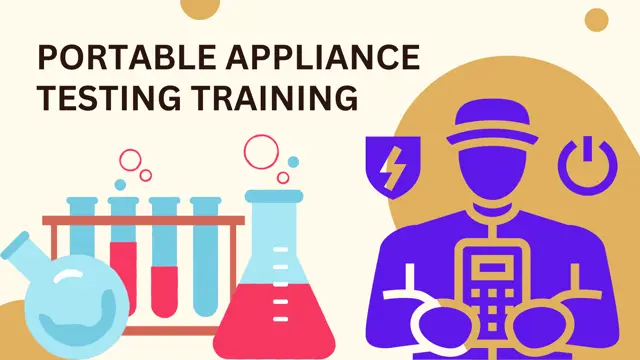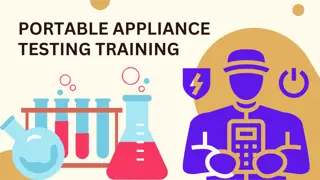
PAT - Portable Appliance Testing Level 3 - CPD Accredited
CPD Certified| Free PDF Certificate | Lifetime Access | Learner Support | No Hidden Fees | 100% Success Rate
EDURISE
Summary
- Reed Courses Certificate of Completion - Free
- Tutor is available to students
Add to basket or enquire
Overview
In today's fast-paced world, the demand for Portable Appliance Testing (PAT) professionals has surged to unprecedented heights. With the increasing reliance on electrical equipment and appliances across industries, businesses are prioritizing safety and compliance. This has created an enormous demand for skilled individuals who can ensure the safe operation of electrical appliances and equipment through PAT.
The Booming Demand for PAT Professionals
Let's delve into some compelling data that underscores the incredible demand for PAT professionals:
- Rapid Technological Advancements: In the digital age, the proliferation of electronic devices is relentless. Businesses are constantly upgrading their equipment, leading to a growing need for PAT professionals to assess the safety of these appliances.
- Legal and Regulatory Compliance: Governments and regulatory bodies are tightening safety standards, making it mandatory for businesses to conduct regular PAT testing. Failure to comply can result in hefty fines and reputational damage.
- Increased Awareness: Companies are recognizing the importance of PAT in preventing electrical accidents and fires. This heightened awareness has led to an upsurge in the demand for certified PAT experts.
- Diverse Industry Applications: PAT professionals are in demand across various industries, including healthcare, hospitality, manufacturing, and construction. This versatility provides a wide range of job opportunities.
The Business Advantage of PAT Training
Businesses are reaping numerous benefits by investing in PAT training for their employees:
- Legal Compliance: Avoid costly fines and legal consequences by ensuring your appliances meet safety standards.
- Enhanced Safety: Protect your employees and customers from electrical hazards, reducing the risk of accidents and downtime.
- Improved Efficiency: Regular PAT testing can identify faulty equipment, preventing costly breakdowns and production interruptions.
- Competitive Edge: Demonstrating a commitment to safety can enhance your company's reputation, attract more customers, and win lucrative contracts.
Unlock a Rewarding Career
Embarking on a career in PAT testing promises a bright future:
- Job Security: With the growing emphasis on electrical safety, PAT professionals are in constant demand, ensuring job security in any economic climate.
- Lucrative Earnings: As a certified PAT expert, you can earn a competitive salary, with opportunities for overtime and additional bonuses.
- Career Advancement: There's room for growth in this field, from technician roles to management positions, and even entrepreneurship.
- Industry Variety: Work across diverse sectors, from healthcare to entertainment, allowing you to explore different environments and challenges.
Are you ready to tap into the booming demand for PAT professionals? Our comprehensive Portable Appliance Testing Training course equips you with the knowledge and skills needed to excel in this rewarding field. Don't miss out on this opportunity to secure a prosperous future for your business or embark on a fulfilling career in electrical safety. Enroll today and power up your potential!
Certificates
Reed Courses Certificate of Completion
Digital certificate - Included
Will be downloadable when all lectures have been completed.
Curriculum
Course media
Description
Learning Outcomes:
Comprehensive Understanding of PAT Principles: Upon completing this course, students will possess a deep understanding of the fundamentals of Portable Appliance Testing, including its importance, legal requirements, and its role in electrical safety.
Proficiency in Electrical Safety: Students will be well-versed in electrical principles and safety protocols, ensuring they can identify potential hazards and take appropriate measures to mitigate risks effectively.
Mastery of Testing Equipment and Procedures: Graduates will have the knowledge and skills needed to use testing equipment confidently and perform PAT procedures accurately, ensuring appliances are safe and compliant.
Effective Visual Inspection and Risk Assessment: Students will be able to conduct visual inspections and risk assessments to identify potential issues, ensuring appliances are safe for use and adhering to regulatory standards.
Thorough Recording and Reporting Skills: Graduates will be proficient in documenting and reporting PAT results, providing clear and concise reports to stakeholders, supporting informed decision-making and compliance.
Module Descriptions:
Module 1: Introduction to Portable Appliance Testing
- This module provides an overview of Portable Appliance Testing, its significance in electrical safety, and the legal requirements surrounding it.
Module 2: Electrical Principles and Safety
- This module delves into electrical principles, ensuring students grasp the fundamentals. It also covers safety protocols, hazard identification, and safety measures.
Module 3: Testing Equipment and Procedures
- Here, students learn about the various testing equipment used in PAT, how to operate them effectively, and the procedures for conducting comprehensive PAT tests.
Module 4: Visual Inspection and Risk Assessment
- This module focuses on visual inspection techniques and risk assessment methods to identify potential safety hazards in electrical appliances.
Module 5: Recording and Reporting
- Graduates of this module will be proficient in documenting PAT results accurately and creating clear, actionable reports for clients and stakeholders.
Module 6: Equipment Maintenance and Repair
- Students will learn how to maintain and perform basic repairs on testing equipment, ensuring reliable and accurate PAT testing procedures.
Module 7: Practical Application and Hands-On Training
- This hands-on module provides students with real-world experience in conducting PAT tests, reinforcing their theoretical knowledge and building confidence in their practical skills.
Module 8: Best Practices and Quality Assurance
- This module explores best practices in PAT testing, emphasizing quality assurance measures to ensure reliable and consistent results.
Module 9: Safety Culture and Communication
- The final module focuses on fostering a culture of safety within organizations and effective communication of PAT findings to stakeholders, ensuring a comprehensive approach to electrical safety.
Who is this course for?
Ideal Audience for the Portable Appliance Testing (PAT) Training Course:
Electrical Technicians and Engineers: This course is ideal for electrical professionals looking to expand their knowledge and skills in PAT to ensure the safety and compliance of electrical appliances and equipment.
Safety Officers and Inspectors: Individuals responsible for maintaining safety standards in their organizations, particularly those in industries such as construction, manufacturing, healthcare, and more.
Facility Managers: Managers overseeing facilities and maintenance operations who need to ensure the electrical safety and reliability of equipment in their facilities.
Compliance Managers: Professionals tasked with ensuring their organizations adhere to regulatory requirements, especially in industries where PAT testing is mandated.
Small Business Owners: Entrepreneurs and small business owners aiming to take control of their PAT testing requirements, thereby ensuring the safety of their employees and customers.
Students and Aspiring Technicians: Those looking to enter the field of electrical safety, including students in electrical engineering programs or individuals seeking to start a career as PAT technicians.
Safety Consultants: Consultants advising organizations on safety measures and regulatory compliance, wanting to add PAT expertise to their service offerings.
HSE (Health, Safety, and Environment) Professionals: Individuals responsible for health, safety, and environmental aspects across various industries where PAT is crucial for compliance.
Government and Regulatory Personnel: Government officials and regulatory authorities involved in setting and enforcing safety standards and regulations.
Human Resources Managers: HR professionals aiming to enhance workplace safety and ensure compliance with safety regulations through a solid understanding of PAT principles.
Maintenance and Repair Technicians: Technicians working with electrical equipment who wish to broaden their skill set and contribute to workplace safety.
Quality Control Personnel: Professionals responsible for maintaining product quality and safety in manufacturing settings.
Electrical Equipment Manufacturers: Employees involved in the manufacturing of electrical appliances seeking to ensure their products meet safety standards.
Contractors and Electricians: Contractors and electricians looking to offer comprehensive services, including PAT testing, to their clients.
Safety-Focused Business Leaders: CEOs and business leaders committed to fostering a culture of safety within their organizations.
The course's comprehensive curriculum covers a wide range of topics, making it suitable for individuals with varying levels of experience and responsibilities in industries where electrical safety and compliance are of utmost importance.
Requirements
The Portable Appliance Testing Training has no formal entry requirements.
Career path
PAT Technician: In the UK, PAT technicians can typically earn an annual salary ranging from £18,000 to £25,000.
Compliance Specialist: With experience, advance to a compliance specialist role, where you'll oversee PAT testing operations and ensure adherence to safety regulations. These positions often command salaries between £25,000 and £35,000 per year.
Questions and answers
Currently there are no Q&As for this course. Be the first to ask a question.
Reviews
Currently there are no reviews for this course. Be the first to leave a review.
Legal information
This course is advertised on reed.co.uk by the Course Provider, whose terms and conditions apply. Purchases are made directly from the Course Provider, and as such, content and materials are supplied by the Course Provider directly. Reed is acting as agent and not reseller in relation to this course. Reed's only responsibility is to facilitate your payment for the course. It is your responsibility to review and agree to the Course Provider's terms and conditions and satisfy yourself as to the suitability of the course you intend to purchase. Reed will not have any responsibility for the content of the course and/or associated materials.


